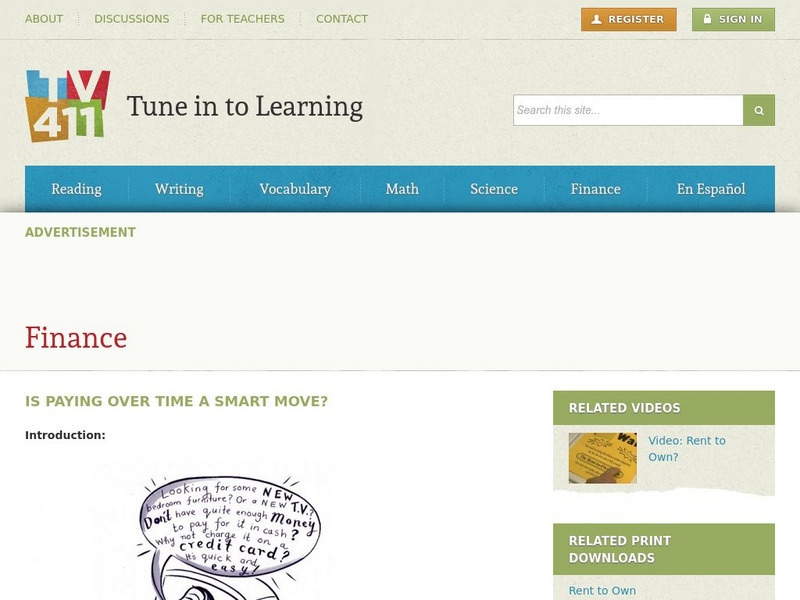Curated OER
What Is in the Water?
Students compare bottled water qualities to water found naturally in a pond habitat. They research their state's laws/regulations in regard to bottled water and study the advertising, cost, and quality of brands of bottled water. They...
Curated OER
Ad Busting
Debunk advertising myths by creating an opposing image. First, find an ad with a persuasive and emotional pull. Once you have identified the message, create a counter-advertisement that shows the opposite message. For example, if an ad...
Curated OER
Marketing to Teens: Parody Ads
High schoolers deconstruct advertising messages by analyzing parody ads and exploring the purpose of satire. Then they create their own parodies based on real ads discussed in class. A creative activity to extend any study of media,...
Media Smarts
Marketing to Teens: Talking Back
Teach your class to talk back in a constructive and respectful way. This focuses in particular on talking back to the media and to advertisers when they have concerns. Learners participate in a brainstorm and then compose letters or...
Curated OER
Avoiding Consumer Fraud: Financial Scams and Schemes
Young consumers get a hefty dose of information on how fraud can put their financial health at risk. The resource provides detailed lecture notes, scaffolded notetaking sheets, vocabulary worksheets, transparencies, and seven links to...
Curated OER
Consumerism
Students examine the techniques that companies use to sell their products. In this consumerism instructional activity students create an ad for a company and create a handcrafted butterfly.
Curated OER
Popcorn Math
Everyone loves popcorn! Use this treat to teach math concepts including place value, estimating, graphing, and volume. Eight possible activities are included, and they can be modified to fit all grade levels.
Curated OER
Who Am I? - Charades
First graders play a game of charades, acting out the roles of producers and consumers. This interactive lesson illustrates how goods and services are produced and consusmed.
Curated OER
Where Did Foods Originate? (Foods of the New World and Old World)
What do papayas, peanuts, pineapples, and potatoes have in common? Why, they are foods explorers brought back to the Old World. Young researchers use the Internet to investigate how New World explorers helped change the Old World's diet....
Curated OER
Counting on Cooperatives
Students are introduced to the study of economics, including an introduction to basic business types and systems. They investigate about international, national and California history as they take a historical tour of cooperatives and...
Curated OER
Name Brands
Students explore the possibility that a products name might bias a consumers decision to buy a particular product. The question remains to be answered, "Why do consumers buy what they buy and why that particular product?"
Curated OER
What Did It Cost 100 Years Ago?
Students compare prices of good across the century in order to introduce the topic of inflation. They undertand the concepts of inflation and Consumer Price Index (CPI), use online calculators to figure the approximate cost of goods...
Curated OER
Habitats
Young scholars complete food chains for organisms in three environments. They use copies of the Habitat worksheet. Students review the food chain terms with the teacher. They research related food chains, and interlink these to form a...
Curated OER
Fourth Grade Earning and Learning Podcast
While this lesson is connected to social studies curriculum that is not identified, the activity could be used as a template for a review of any material. The lesson focuses on a review of vocabulary relating to the economy. Pupils...
Curated OER
Buying a Car
Students complete the PLATO ¿¿ Educational Software lesson: Math Problem Solving: Car Costs to determine if he/she can afford to drive the car they are planning to buy.
Curated OER
Producers and Consumers
Third graders identify the relationship between producers and consumers and supply and demand. They listen to a lecture and complete a variety of graphic organizers to show their understanding.
Curated OER
Biological Communities
Students identify consumers and producers in different communities. Students collect a variety of soil samples and record organisms found in the samples.
Soft Schools
Soft Schools: Ecology Quiz
Take this interactive, multiple-choice quiz over concepts in ecology, then review your score and any missed questions at the end.
Education Development Center
Tune in to Learning: Is Paying Over Time a Smart Move?
At T.V. 411 you can explore the concept of paying over time with situations involving credit cards, rent to own items, and more. This interactive lesson gives the learner an opportunity to make decisions about money management.




















